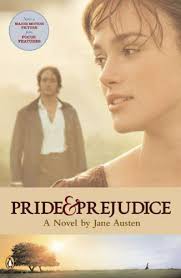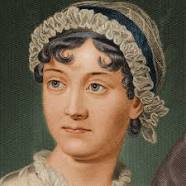Pride and Prejudice Page #11
Pride and Prejudice is a romantic novel by Jane Austen, first published in 1813. The story charts the emotional development of the protagonist, Elizabeth Bennet, who learns the error of making hasty judgments and comes to appreciate the difference between the superficial and the essential. The comedy of the writing lies in the depiction of manners, education, marriage, and money during the British Regency period.
“Yes, she called yesterday with her father. What an agreeable man Sir William is, Mr. Bingley, is not he? So much the man of fashion! So genteel and easy! He has always something to say to everybody. That is my idea of good breeding; and those persons who fancy themselves very important, and never open their mouths, quite mistake the matter.” “Did Charlotte dine with you?” “No, she would go home. I fancy she was wanted about the mince-pies. For my part, Mr. Bingley, I always keep servants that can do their own work; my daughters are brought up very differently. But everybody is to judge for themselves, and the Lucases are a very good sort of girls, I assure you. It is a pity they are not handsome! Not that I think Charlotte so very plain--but then she is our particular friend.” “She seems a very pleasant young woman.” “Oh! dear, yes; but you must own she is very plain. Lady Lucas herself has often said so, and envied me Jane's beauty. I do not like to boast of my own child, but to be sure, Jane--one does not often see anybody better looking. It is what everybody says. I do not trust my own partiality. When she was only fifteen, there was a man at my brother Gardiner's in town so much in love with her that my sister-in-law was sure he would make her an offer before we came away. But, however, he did not. Perhaps he thought her too young. However, he wrote some verses on her, and very pretty they were.” “And so ended his affection,” said Elizabeth impatiently. “There has been many a one, I fancy, overcome in the same way. I wonder who first discovered the efficacy of poetry in driving away love!” “I have been used to consider poetry as the food of love,” said Darcy. “Of a fine, stout, healthy love it may. Everything nourishes what is strong already. But if it be only a slight, thin sort of inclination, I am convinced that one good sonnet will starve it entirely away.” Darcy only smiled; and the general pause which ensued made Elizabeth tremble lest her mother should be exposing herself again. She longed to speak, but could think of nothing to say; and after a short silence Mrs. Bennet began repeating her thanks to Mr. Bingley for his kindness to Jane, with an apology for troubling him also with Lizzy. Mr. Bingley was unaffectedly civil in his answer, and forced his younger sister to be civil also, and say what the occasion required. She performed her part indeed without much graciousness, but Mrs. Bennet was satisfied, and soon afterwards ordered her carriage. Upon this signal, the youngest of her daughters put herself forward. The two girls had been whispering to each other during the whole visit, and the result of it was, that the youngest should tax Mr. Bingley with having promised on his first coming into the country to give a ball at Netherfield. Lydia was a stout, well-grown girl of fifteen, with a fine complexion and good-humoured countenance; a favourite with her mother, whose affection had brought her into public at an early age. She had high animal spirits, and a sort of natural self-consequence, which the attention of the officers, to whom her uncle's good dinners, and her own easy manners recommended her, had increased into assurance. She was very equal, therefore, to address Mr. Bingley on the subject of the ball, and abruptly reminded him of his promise; adding, that it would be the most shameful thing in the world if he did not keep it. His answer to this sudden attack was delightful to their mother's ear: “I am perfectly ready, I assure you, to keep my engagement; and when your sister is recovered, you shall, if you please, name the very day of the ball. But you would not wish to be dancing when she is ill.” Lydia declared herself satisfied. “Oh! yes--it would be much better to wait till Jane was well, and by that time most likely Captain Carter would be at Meryton again. And when you have given your ball,” she added, “I shall insist on their giving one also. I shall tell Colonel Forster it will be quite a shame if he does not.” Mrs. Bennet and her daughters then departed, and Elizabeth returned instantly to Jane, leaving her own and her relations' behaviour to the remarks of the two ladies and Mr. Darcy; the latter of whom, however, could not be prevailed on to join in their censure of her, in spite of all Miss Bingley's witticisms on fine eyes. Chapter 10 The day passed much as the day before had done. Mrs. Hurst and Miss Bingley had spent some hours of the morning with the invalid, who continued, though slowly, to mend; and in the evening Elizabeth joined their party in the drawing-room. The loo-table, however, did not appear. Mr. Darcy was writing, and Miss Bingley, seated near him, was watching the progress of his letter and repeatedly calling off his attention by messages to his sister. Mr. Hurst and Mr. Bingley were at piquet, and Mrs. Hurst was observing their game. Elizabeth took up some needlework, and was sufficiently amused in attending to what passed between Darcy and his companion. The perpetual commendations of the lady, either on his handwriting, or on the evenness of his lines, or on the length of his letter, with the perfect unconcern with which her praises were received, formed a curious dialogue, and was exactly in union with her opinion of each. “How delighted Miss Darcy will be to receive such a letter!” He made no answer. “You write uncommonly fast.” “You are mistaken. I write rather slowly.” “How many letters you must have occasion to write in the course of a year! Letters of business, too! How odious I should think them!” “It is fortunate, then, that they fall to my lot instead of yours.” “Pray tell your sister that I long to see her.” “I have already told her so once, by your desire.” “I am afraid you do not like your pen. Let me mend it for you. I mend pens remarkably well.” “Thank you--but I always mend my own.” “How can you contrive to write so even?” He was silent. “Tell your sister I am delighted to hear of her improvement on the harp; and pray let her know that I am quite in raptures with her beautiful little design for a table, and I think it infinitely superior to Miss Grantley's.” “Will you give me leave to defer your raptures till I write again? At present I have not room to do them justice.” “Oh! it is of no consequence. I shall see her in January. But do you always write such charming long letters to her, Mr. Darcy?” “They are generally long; but whether always charming it is not for me to determine.” “It is a rule with me, that a person who can write a long letter with ease, cannot write ill.” “That will not do for a compliment to Darcy, Caroline,” cried her brother, “because he does not write with ease. He studies too much for words of four syllables. Do not you, Darcy?” “My style of writing is very different from yours.”
Translation
Translate and read this book in other languages:
Select another language:
- - Select -
- 简体中文 (Chinese - Simplified)
- 繁體中文 (Chinese - Traditional)
- Español (Spanish)
- Esperanto (Esperanto)
- 日本語 (Japanese)
- Português (Portuguese)
- Deutsch (German)
- العربية (Arabic)
- Français (French)
- Русский (Russian)
- ಕನ್ನಡ (Kannada)
- 한국어 (Korean)
- עברית (Hebrew)
- Gaeilge (Irish)
- Українська (Ukrainian)
- اردو (Urdu)
- Magyar (Hungarian)
- मानक हिन्दी (Hindi)
- Indonesia (Indonesian)
- Italiano (Italian)
- தமிழ் (Tamil)
- Türkçe (Turkish)
- తెలుగు (Telugu)
- ภาษาไทย (Thai)
- Tiếng Việt (Vietnamese)
- Čeština (Czech)
- Polski (Polish)
- Bahasa Indonesia (Indonesian)
- Românește (Romanian)
- Nederlands (Dutch)
- Ελληνικά (Greek)
- Latinum (Latin)
- Svenska (Swedish)
- Dansk (Danish)
- Suomi (Finnish)
- فارسی (Persian)
- ייִדיש (Yiddish)
- հայերեն (Armenian)
- Norsk (Norwegian)
- English (English)
Citation
Use the citation below to add this book to your bibliography:
Style:MLAChicagoAPA
"Pride and Prejudice Books." Literature.com. STANDS4 LLC, 2025. Web. 10 Jan. 2025. <https://www.literature.com/book/pride_and_prejudice_9>.




Discuss this Pride and Prejudice book with the community:
Report Comment
We're doing our best to make sure our content is useful, accurate and safe.
If by any chance you spot an inappropriate comment while navigating through our website please use this form to let us know, and we'll take care of it shortly.
Attachment
You need to be logged in to favorite.
Log In